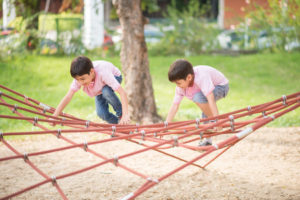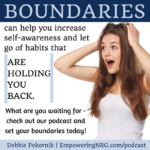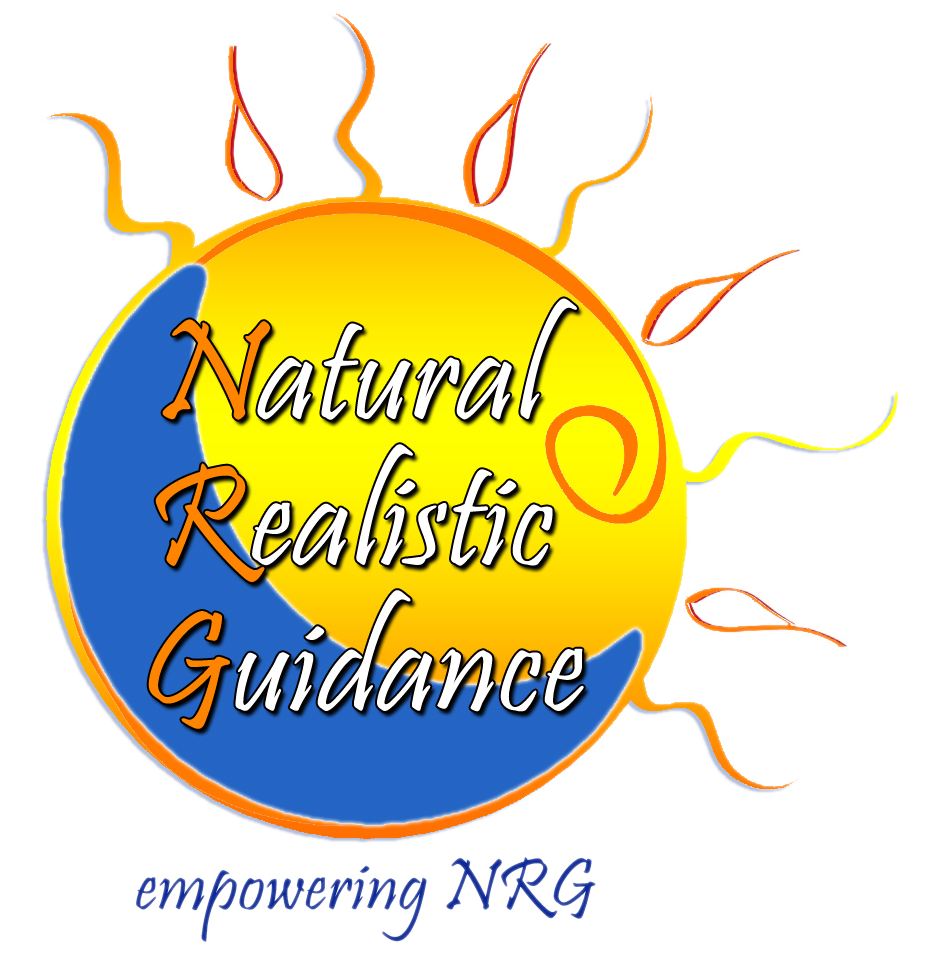Podcast 018 - Boundaries
Today we're going to talk about a tool or process that can help you increase self-awareness, realign with your overlying purpose, release habits that are holding you back and reconnect with your inner wisdom.
Said this way it sounds like a really big deal – doesn't it? In reality though, if I didn't introduce it that way, chances are you would miss the relevance and just see it as a parenting or relationship building tool that would be found in  any good program.
any good program.
This is how awakening happens… using real life to help you be the best version of yourself you can possibly be at this point in time. It's about switching off autopilot on a regular basis and giving conscious thought to why you are doing what you are doing, as well as tuning in to whether it resonates with who you are (or who you want to be).
So today's topic is from my Communicating with Kids Program. If you are not actively parenting (even if you are) you can use this information to help you lead groups, create a strong work place, coach a team, or build strong relationships with significant people in your life. You might need a bit of help to adjust the info to fit these situations, but it certainly can be done.
Our topic is boundaries; specifically how to consciously create and support them. I'm going to use parenting examples to illustrate what I mean, but feel free to take what I'm saying and alter it to fit your life.
This is an important topic for you to be aware of because we all need, want and have boundaries. They determine where we end and another person begins, in fact unhealthy relationships such as; co-dependency, hyper parenting or even obsessions (think stalker) are all connected in some way to fuzzy boundaries. Boundaries determine how we treat and look after ourselves (self-respect); and what the bottom line is that should not be crossed in any group – family, school, country… (in a society crossing the bottom line might mean jail, expulsion, excommunication or even execution).
When you consciously create and enforce your boundaries in a healthy, consistent way, you will feel, look and sound vibrant and powerful.
Personal Boundaries – where it all begins…
When a child is newborn his personal boundaries are almost non-existent; he depends on others to feed him, change him, put him to bed, etc. As he matures his ability for self-care grows and with it his ownership of his boundaries. At least that's the way it is intended to work. There are definitely situations where this does not follow this kind of model, because the child has something getting in the way of his ability to take ownership. This news will forever affect your personal boundaries as a parent, because it often means that what you thought was a temporary task of looking after another, is now an on-going, maybe even lifelong project.
If this is your situation, then in case you haven't already tuned into this – you want to really open yourself up to the idea of receiving help. Respite, summer camps, school programs, family and friends are all things you'll want to explore. You do not need to go this alone and there is no reason to feel guilty for needing, wanting and accepting help.
A quick clarification – we all benefit when we open ourselves up to receiving, whether it be a helping hand, a gift, a compliment, etc. It's just these moms often feel they are in a unique situation that they need to handle on their own. We will talk about receiving more in future podcasts, but for now I wanted to make sure no one thought I was suggesting only people with tough situation need help. When in reality, we all do.
The other situation that is causing trouble for some parents is a slipping of awareness and fuzzy-ing of the lines/roles. As a result, there are many families where control of personal boundaries are held by the parents for far longer than is healthy or helpful. This type of parenting has all kinds of clever names – hyper-parenting, helicopter-parenting, over-parenting, pampered-parenting – but the outcome is anything but cute.
Personal boundaries are extremely important in future relationships and our own self-care. These are the boundaries that allow us to insist on being treated respectfully; allow us to say what can and cannot be done to our body; influence how we treat and look after ourselves (self-respect) and determine how healthy our future intimate relationships will be.
Help your child develop healthy personal boundaries by:
Allowing him to make simple choices about things that affect him (food, sleep, clothing, toys) from early on. Remember, living an awakened life is about making choices that bring you closer to your truth… help your child start practicing making good choices right from young.
- Using mistakes and ‘bumps in life’ as moments to highlight the learning in a positive way – watch out for the ego's desire to blame/shame/ridicule by calling in your higher self to help when these moments arise.
- Establishing and respecting privacy rules for yourself and your child
- Trust - Giving choices is meaningless if you keep nagging, reminding, saving, fixing, correcting and covering up for your child. Give them a choice, make sure they are making an informed decision and trust them to survive.
When my kids were young I used to suggest they go outside before leaving for school with whatever outdoor gear they were choosing to wear. If they could stay out there for 5 minutes and be comfortable they could wear it to school (they typically came back in after 30 seconds requesting more layers). I wanted them to learn how to think about and assess the weather rather than just wear what I thought they needed.
I should mention that this fell apart a little bit when my oldest reached the 'cool' stage (around 12-13). He suddenly decided that winter that he was warm enough to be outside with runner, no jacket, nothing on his head… We live in Manitoba, Canada – where body parts can actually freeze and fall off on the really cold days so this was a safety issue.
I talked to him about it and he assured me he felt warm enough. Part of the safety issue was that he travelled on a school bus which could break down and result in a wait. Should that happen it was possible he could experience some hypothermia. After seeking to understand what was going on for him and knowing that my kids were being raised in a home where 'forcing' anything was not the norm I had a sudden inspiration as to how to proceed.
I told him, "I don't know what's going on, but it appears your personal thermostat is broken. One of my most important jobs as a mom is to  help you stay safe and going outside in winter where we live, without warm clothing is not safe. As a result, until we figure out how to fix your thermostat I will have to use mine and the weather forecast to make smart decisions for you. I'll let the school and the bus driver know what we're doing so they can remind you when I'm not there. I don't like this one bit and I hope the problem straightens itself out quickly, so please let me know the moment your system starts sending signals like shivering, burning ears, tearing eyes, frozen/hurting toes or fingers, because that's a sign that your system is coming back online."
It worked. The next day he put on his jacket, runners, favorite toque and gloves. Not as warm as I would have liked him to dress, but enough to keep him and his body parts from freezing off.
help you stay safe and going outside in winter where we live, without warm clothing is not safe. As a result, until we figure out how to fix your thermostat I will have to use mine and the weather forecast to make smart decisions for you. I'll let the school and the bus driver know what we're doing so they can remind you when I'm not there. I don't like this one bit and I hope the problem straightens itself out quickly, so please let me know the moment your system starts sending signals like shivering, burning ears, tearing eyes, frozen/hurting toes or fingers, because that's a sign that your system is coming back online."
It worked. The next day he put on his jacket, runners, favorite toque and gloves. Not as warm as I would have liked him to dress, but enough to keep him and his body parts from freezing off.
Family/Group/Team boundaries
It doesn't take long for a baby to figure out he has some control over what he eats or when he sleeps. As he continues to grow he gains control over his mobility…which toys he likes…who he plays with…what he wears. While all this happens, his parents begin putting boundaries in place and restricting his choices in an effort to keep him safe and prepare him for life.
A quick side note – if you're trying to apply this information to a work environment or with a group or team…you obviously don't have to wait for people to mature… you just skip right to what boundaries need to be in place, what rules would support them and how to deal with non-compliance.
When you base your rules and corrections on boundaries which support your values, you create a structure that provides a sense of safety; an understanding of the consequences and teaches life skills that your kids can take with them.
A parent on autopilot…
Pretend you have a baby who loves to climb. From the moment he is mobile you find him climbing the couch, then standing on stools, and soon figuring out ways to get on the counter. The fact that he appears to have no fear around climbing is concerning to you so you start trying to restrict him. You create a rule about climbing. RULE: There will be no climbing unless mommy or Daddy says it's okay to do so.
Then you move into enforce mode:
"Get down! No climbing," "Climbing is dangerous" "Did mommy say you could climb that?" "Be careful."
This is very tiring…especially as he gets older, faster and more agile and you have other responsibilities (like another child) come into your life. As a result you start to let things slip… Your inconsistent in how and when you correct and he is learning not to think for himself but to see what he can get away with.
When your son starts school you warn the teachers "he's a climber" – he'll climb anything and everything if he's not watched carefully. The first week of school you're called because your son has climbed the schoolyard fence and has hurt himself.
Can you see this happening? Maybe it's not climbing for your child, maybe he plays with sticks, or puts everything in his mouth (or up his nose), maybe he's drawn to water… these are all safety issues and therefore things that are critical to teach our kids about.
The problem is, in this situation the parent hasn't really thought beyond protecting their child in the moment. That means you are not teaching life skills that he can take with him, but are focused on stopping a behaviour you see as a problem.
This can't work because:
- You can't always be there to save your child
- Your unpredictable responses are causing your child to risk getting in trouble in hopes he might get away with it
- Your child is not learning the seriousness of his actions
- Your punitive approach makes him learn to hide his actions which could result in a tragic accident in the future.
The awakened parent…
So, let's do this same scenario with a parent who has decided to consciously correct using relationship building techniques.
The moment you realize how much your child loves to climb you start creating safe opportunities for him to do so. (i.e. huge cushion piles; baby play structures…)
In these environments you allow him to climb and fall without any ineffective verbal restrictions (you're going to fall and hurt yourself; be careful! ). When he rolls down with a pillow and lands a little hard on the carpet you let him come to you rather than rushing over to see if he's okay. If he comes to you for consoling you offer a hug and a bruise bear (ice pack) for the ow-ee.
When your child starts to climb on things he is not allowed to you say, "No." If he doesn’t stop you remove whatever he is stacking to make the climb. If he tries again you put him in his playpen; bedroom; whatever you've decided is a safe place to remove him from the current situation.
As he gets older you offer new, safe and interesting opportunities to climb. Low trees (Birdshill park); playstructures; rope attached to a beam in the basement with cushions below… your goal is to teach him to climb safely – since this is obviously something he really wants to do.
You still clearly and firmly say "No!" if he tries to climb something unsafe and follow through with clear and consistent consequences – you will go home from the park; go in the house; sit in time-out…whatever you have clearly defined ahead of time. There is no warning or second chance…there is also no reprimanding or shaming… you simply put the consequence into place if he doesn't listen. Whenever possible you reward him for listening with a climb.
When he's old enough you talk about what happens when things fall from up high… you talk about his head being like a melon… you might even go up on something high with him and drop the melon to show him what can happen. You're not trying to scare him, but inform him because he has no idea of the true consequence of a big fall at this point. You don't want him to learn through the real deal, so you need to creatively come up with ways to teach him to respect the power of gravity.
If you can afford it, you take him to climbing walls when he is old enough (they will teach him safety pieces that he will hear more clearly from others); if you can't afford it use your creativity to come up with ways to learn through experience (hiking?).
This doesn't ensure your child will never hurt themselves or even perhaps have a tragic accident, but at least doing it this way, you have a chance of your child fully internalizing a very important message and learning to respect safety rules.
In summary…
Boundaries are an important part of your family structure and should be consciously chosen to guide your kids towards living what you consider to be a safe life. You cannot protect them from everything – accidents happen unexpectedly, that's why they are called accidents.
If you have a whole bunch of rules that don't really have meaning (at least none that the kids can see) you are using your parent power to get your way and keep your lives as stress free as possible. In actuality this increases your stress because when kids are unclear of the rules and why they are important they tend to test them more. This is especially true if they get an inconsistent response.
Time to apply it…
I've decided to do something different on this podcast and rather than lead you through the excises offer a section from my Communicating With Kids Workbook to those who are interested. This is normally a tool parents would receive as part of the paid program, but I would like to give it to you in exchange for a review of the podcast.
Write a review on itunes or directly on our website podcast page. Send us an email at LJempoweringNRG@gmail.com letting us know and we'll send you the link for the Boundaries section in the workbook. If you're nervous to leave a review because it would be less than 4 stars, feel free to instead send that information in the email (complete with what you feels loses us stars) and we'll use that information to improve things if we can. Either way you'll still get the link.
The workbook takes you step by step through a process that will help you uncover what boundaries are required, how to create them, how to share them with your kids (team, class, staff…) and how to enforce them.
Consciously choosing and enforcing boundaries will help you use all that we've been discussing in these podcasts in a practical and empowered way.
With much respect for you and the journey you are on… This is Debbie Pokornik, wishing you a vibrant and powerful day. If you enjoyed this podcast/article please like/rate/review and subscribe… that’s what keeps us going! Click here now to enjoy our other podcasts.


